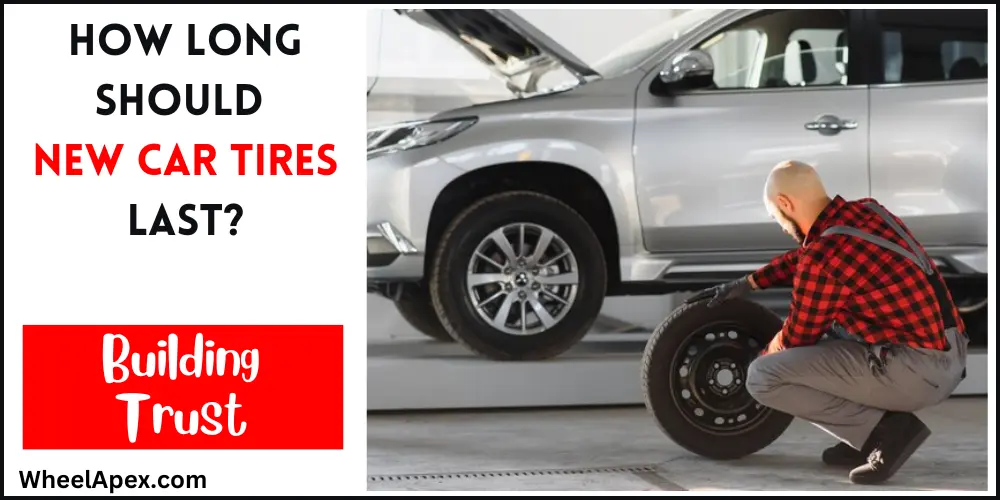With regards to your vehicle’s presentation and security. Hardly any components are all around as significant as the tires under it. Understanding how long should new car tires last isn’t simply a question of a financial plan for substitution. It’s tied in with guaranteeing the safety and effectiveness of your excursion. In this article, we’ll look at the life expectancy of tires, factors influencing their life span, indications of wear, and tips to expand their life expectancy. How about we explore the way to life span with certainty and information?
How Long Should New Car Tires Last?
Tire life alludes to the timeframe a tire can perform at its best before waiting to be supplanted. Discuss how long should new car tires last. Even though life expectancy shifts given a few factors. The objective is to expand the mileage and security given by each arrangement of tires. A tire’s life expectancy is estimated in miles, with producers. Giving evaluations given commonplace driving circumstances.
On average, new car tires should last between 50,000 to 70,000 miles, depending on factors such as driving habits, road conditions, and proper maintenance. Regularly checking and maintaining tire pressure, alignment, and rotation can help extend their lifespan.
Factors Influencing Tire Longevity
Several factors play a role in determining how long your tires will last:
- Driving habits: Aggressive driving, sudden stops, and sharp turns can accelerate tire wear.
- Road Conditions: Rough or poorly maintained roads cause tire wear faster.
- Tire Care: Regular tire rotation, proper inflation, and wheel alignment can significantly extend tire life.
- Climate: Extreme temperatures, whether hot or cold, can affect tire performance.
- Tire Quality: High-quality tires often have a longer lifespan due to superior materials and construction.
Understanding these factors empowers drivers to take proactive steps to extend the life of their tires.
Signs Of Tire Wear
It is important to recognize the signs of tire wear to maintain maximum safety. Watch out for:
- Tread Depth: Tire depth must exceed the legal limit (usually 2/32 inches) to ensure adequate traction.
- Uneven Wear: Irregular wear may indicate alignment problems or improper inflation.
- Cracks or Bulges: Visible sidewall damage, cracks, or bulges can compromise the integrity of the tire.
- Vibration: Excessive vibration while driving can indicate balance or alignment problems.
Regularly inspecting your tires for these signs ensures early detection of problems. It promotes safer driving conditions.

Average Lifespan Of New Car Tires
Even though it is challenging to decide the specific age of all new vehicle tires. Because of fluctuating circumstances, the agreement is that tires should endure somewhere in the range of 25,000 and 50,000 miles. The question raised is how long should new car tires last. Nonetheless, this might fluctuate in light of the elements referenced before. Premium tires and those intended for explicit circumstances can have a more extended life expectancy.
Extending Tire Lifespan
Maximizing the life of your tires requires proactive maintenance:
- Regular Inspections: Check tire pressure, tread depth, and overall condition monthly.
- Rotation: Rotate tires regularly to ensure even wear and extend their lifespan.
- Alignment: Keep your wheels appropriately adjusted to forestall lopsided tire wear.
- Balancing: Ensure proper wheel balancing to prevent vibration and uneven tire wear.
By integrating these practices into your daily schedule. You can broaden the existence of your tires, setting aside cash and guaranteeing a more secure driving experience.
When To Replace Tires
Knowing when to substitute your tires is significant for your security. Consider the following guidelines:
- Tread Depth: Supplant tires when the track profundity arrives at 2/32 of an inch.
- Age: Even with enough tread, tires should be replaced after six to ten years, as rubber degrades over time.
- Visible Damage: If you notice cracks, bulges, or other visible damage, replace the tire immediately.
Being proactive about replacing tires guarantees that your vehicle is outfitted. With the most ideal footing and taking care of capacities.
Related:
FAQs
Do New Car Tires Wear Out Faster?
New tires last longer due to their full depth, offering superior performance and longevity.
How Often Should You Replace New Tires?
Change frequency varies but is usually between 25,000 and 50,000 miles, depending on driving conditions and maintenance.
How Many Kilometers Should Tires Last?
Tire life is measured in miles, averaging 25,000 to 50,000 miles, taking into account various factors.
What Is The Lifespan Of A Car Tire?
Due to the aging of rubber, a typical tire has a lifespan of six to ten years, regardless of tread depth.
Why Are New Tires Better?
The new tires provide excellent traction, handling, and safety with full depth for high performance.
Will New Tires Improve Ride Quality?
New tires can enhance ride quality by providing better grip, traction, and smoother handling.
Conclusion:
In the vehicle proprietorship venture. Understanding how long should new car tires last? The period of new vehicle tires is significant for both safety and reserve funds. By taking on normal upkeep, perceiving indications of wear. By knowing when to supplant tires, drivers can guarantee a smooth and safe ride. Put resources into the life span of your tires. Let the street ahead be a way of energy and certainty. Where each mile is a demonstration of your obligation to somewhere safe and secure and execution.
Sources:
- By Andrew McGregor, Don’t tires last up to 50,000 miles? I got my car new and now I have 36,000 miles on my car and was told I already need new tires, is that right? I want to drive from Colorado to Texas, will they be fine or should I get them changed just in case? Posted 2 Years Ago.
- By byu/pr8547, How long should tires last? Posted 5 Years Ago.

